FREE Training: How to Launch Your Property Management Company
Starting a property management company in North Carolina is a very worthwhile, yet daunting journey.
While there are many reasons why being a property manager is an excellent career decision, it also requires a lot of hard work, determination, and perseverance.
So, if you are a property manager in North Carolina that wants to know more about what it takes to start your own company, then you have come to the right place!
Keep reading to find out more about the journey that lies ahead, and what you will need to do to prepare for it.
What Does a North Carolina Property Manager Do?
A North Carolina property manager has a long list of responsibilities and daily tasks that makes them essential to the world of rental properties.
Given the level of responsibility that property managers have to take care of on a day to day basis, there are a number of qualities that you will need in order to succeed in the long run.
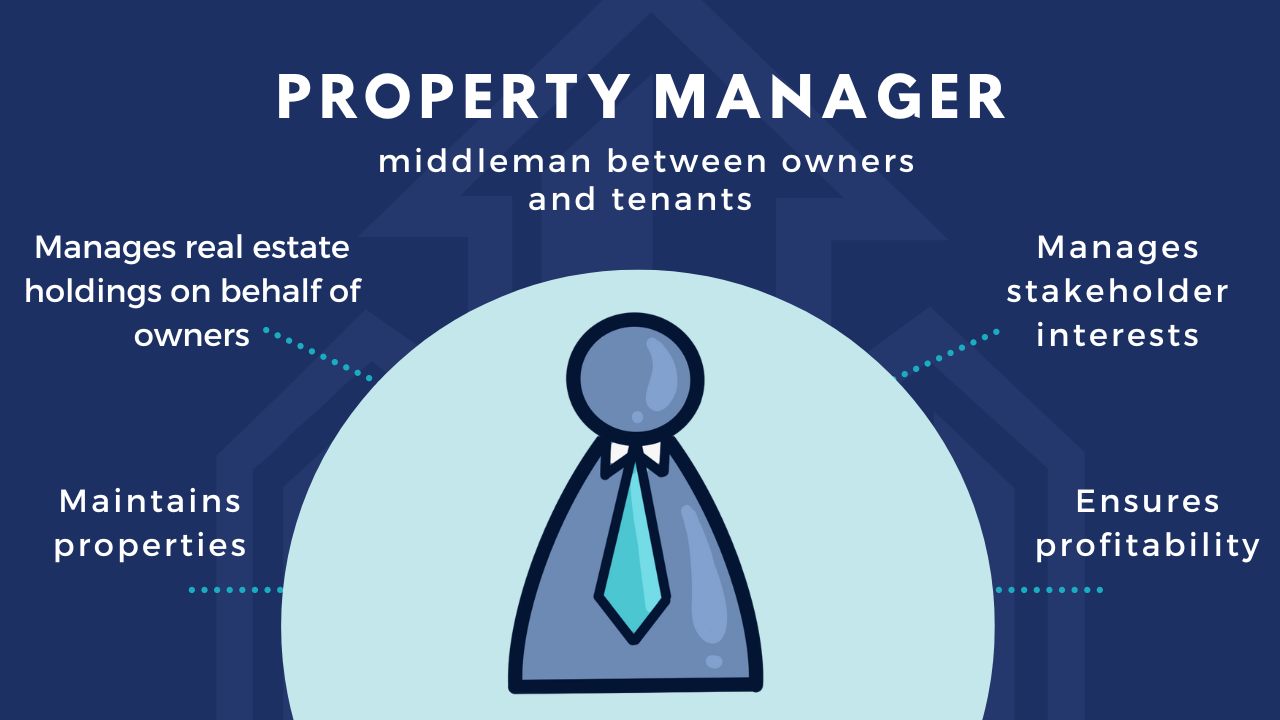
First, you will need determination. This industry takes a lot of hard work, so you will need to be able to keep going, even when you are overwhelmed.
Second, you will need communication skills. Property management largely involves communicating with all different kinds of people, so this is crucial to your long term success.
Lastly, you will need to be organized. This will help you to stay on top of your work and provide clients with high quality services.
So, if you think you have what it takes, then keep reading to find out more about starting your North Carolina property management company!
Step 1: Determine How You Want to Structure Your Business
In order to begin your journey as an established property management company in North Carolina, you will need to understand all the different options that you have for structuring your business and be able to choose the best one for your needs.
Your first step in setting up your property management company is choosing a name for your business and legally registering it.
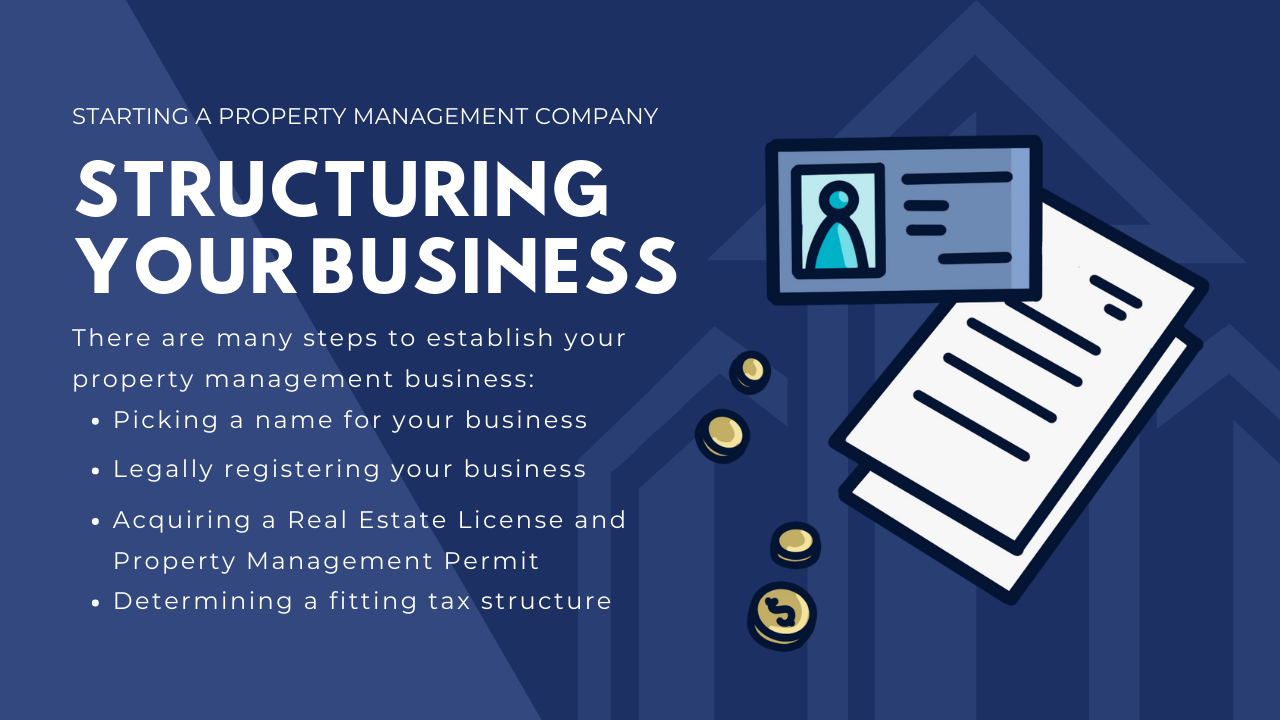
In North Carolina setting up a legal entity can be a complicated task for any business. For this reason, we recommend working with a corporate accountant in North Carolina that is familiar with all of the ins and outs of this process.
Another excellent resource for information on registering your business as a legal entity is your local chamber of commerce organization.
If you are equipped with a solid business plan, you will be able to make important decisions regarding the structure of your company. This will help you protect yourself in the long run from personal and professional liability.
Just like many other states in the US, any property manager must become a licensed real estate broker before taking on any properties.
So, now that you are properly licensed for property management, you will need to legally register it.
Generally, the majority of property management companies choose to either register their business as a LLC or an unincorporated business entity.
While both of these options will have their own list of pros and cons to consider, it is ultimately best to consult an attorney or CPA who has experience with corporate tax filings and registrations.
Coupled with extensive research on your end, this will help you decide what the best corporate structure will be for your business.
Step 2: Familiarize Yourself With All of the Rental Property Related Laws in North Carolina
After you have set up your property management company as a legal entity in North Carolina, you will need to come up with a solid, legally binding contract for all of your future clients.
By starting this process early, you can get all of the fees and time consuming work out of the way at the beginning.
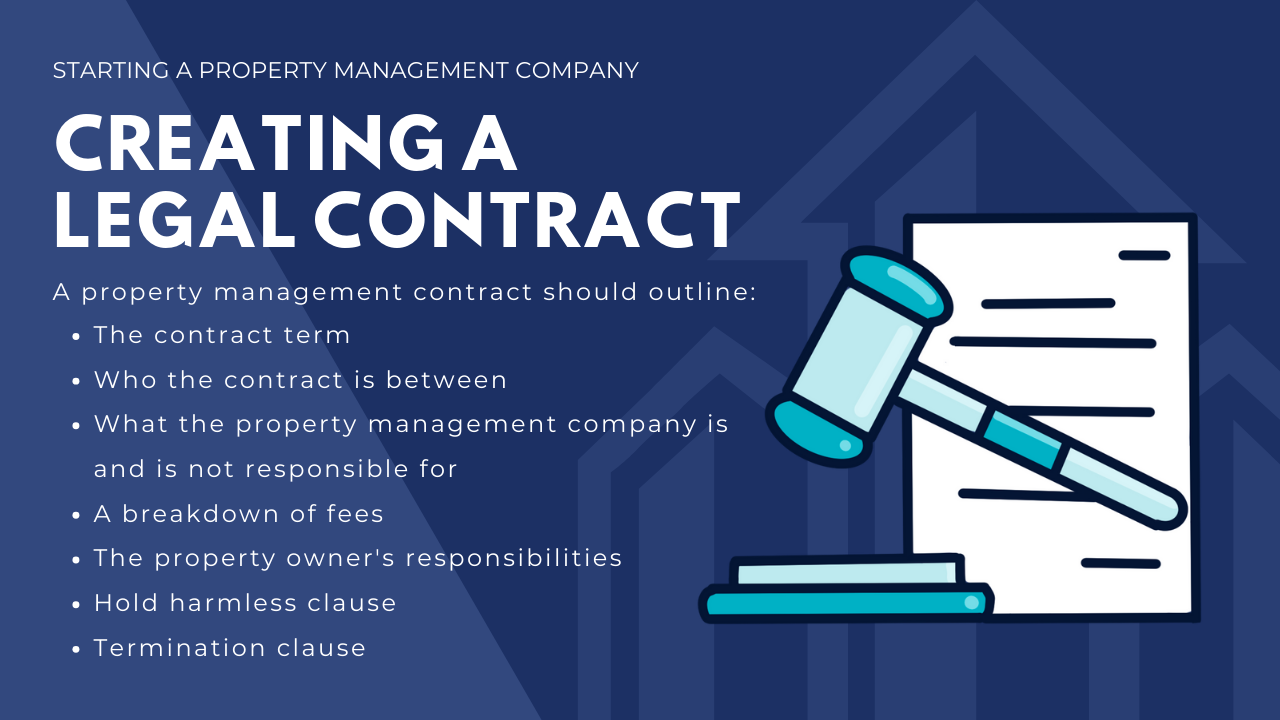
Working with a licensed attorney that specializes in property management, you can work to create a solid contract which will make sure that both yourself and your company are legally protected in the future against liability, fraud, and a variety of other risks.
Keep in mind that your property management contracts must be in line with all of North Carolina’s laws.
Your property management contract should ultimately include the following in order to be the best that it can be:
- The term of the contract (when it begins and when it ends)
- All parties included in the contract (your company and the owner of the rental property)
- What your responsibilities will be over the duration of the contracted time, including maintenance of the rental property, advertisement, leasing, tenant screening, managing tenants, collecting rent, handling emergencies, and more.
- What your property management company will not be responsible for the duration of your contract
- A thorough breakdown of any and all fees that will be owed by the landlord to your company
- The property owner’s responsibilities
- Hold harmless clause, which is a legal statement that absolves one or all parties of any legal liabilities should any damage or injuries occur in relation o one of the parties signing the contract
- Termination clause, which outlines the terms that allow each party to end the contract with or without penalty.
FREE Training: How to Launch Your Property Management Company
Step 3. Come up With a Solid Business Plan and a Scalable Structure for Your Company
As you continue on in your journey to start a property management company, it is crucial to keep both your short term and long term goals in mind. This will help you plan accordingly for your business.
At the end of the day, there are generally two ways that property management companies are structured:
- One primary property manager oversees all client and tenant responsibilities: This is based on the general property manager who contracts out work to other businesses.
- A property management company that has employees on payroll: This structure has a more balanced approach to responsibility and allows for each employee of the business to focus on their own unique tasks.
While these may be the two most popular structures for property management companies in the industry, you won’t be forced to simply choose one and stick with it forever.
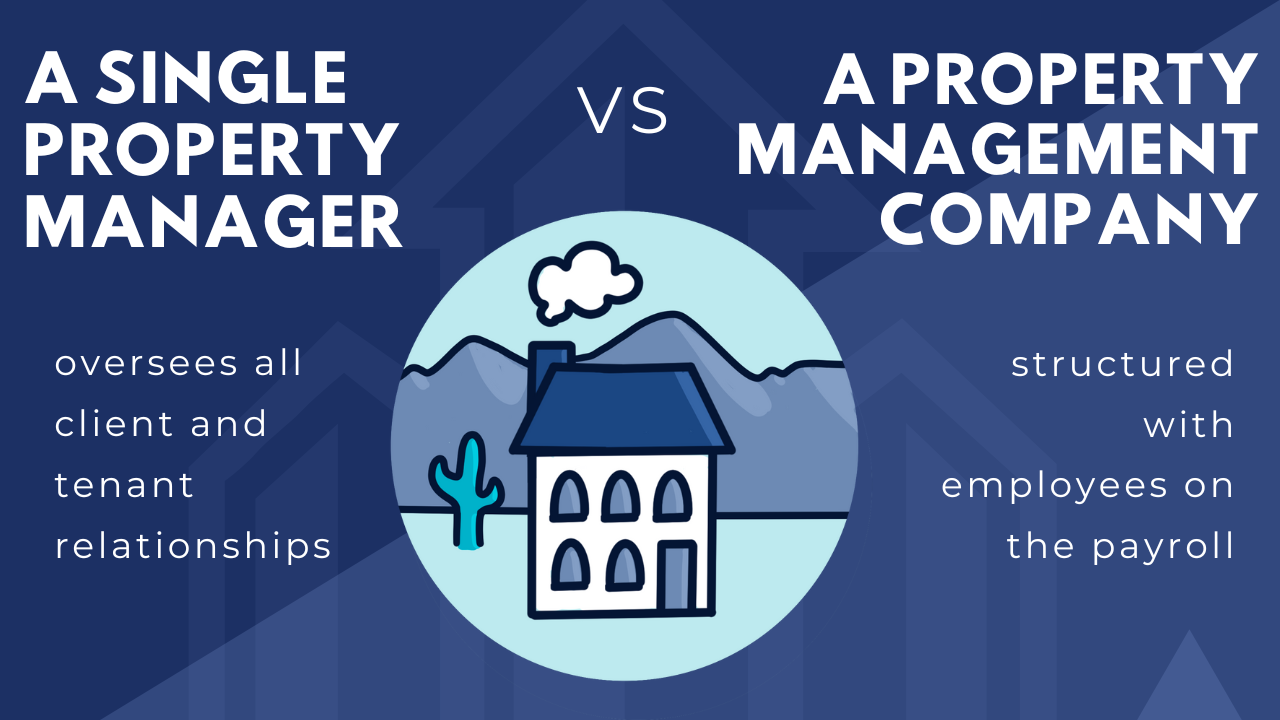
In fact, the majority of property managers start as a sole proprietor that primarily works with contractors and other businesses to get work done.
Then, as their business grows over time and they begin to work with more and more clients, this structure will shift to include employees on payroll and a more established business hierarchy.
When you expand your property management company in North Carolina, there are a number of part time, full time, and contracted roles that you may consider adding to your team.
This will help you delegate some of the many tasks associated with property management, allowing you to provide your clients and tenants with a higher quality of services.
With more time and energy on your hands, you can also focus on other important tasks such as expanding your business.
Here are some of the most common extra roles that you may be able to hire new employees to cover:
- A team of property managers to oversee multiple units and act on your behalf.
- Administrative support
- Sales representatives
- Accountants and other finance experts
- Leasing agents, tenant managers, and showing coordinators
- Maintenance managers
- Service coordinators
- Advertising experts
As your business grows, there are a number of contract roles that you may want to include, such as:
- A solid real estate accountant
- A real estate attorney
- Contractors for specialized maintenance and repairs
- Information Technology (IT) staff to help with your business systems
The main thing to keep in mind as you begin to onboard new employees and contractors is that they will ultimately reflect your business.
As such, you always need to make sure that your employees are adequately licensed and trained, in addition to being professional and positive to work with for both your team and your clients.
FREE Training: How to Launch Your Property Management Company
Step 4: Find a Software That Can Meet Your Property Management Company’s Needs
At the end of the day, property management involves a lot of tasks and responsibilities that will constantly be competing for your attention each day.
If these responsibilities are not organized and handled correctly, then it could be a detriment to your business.
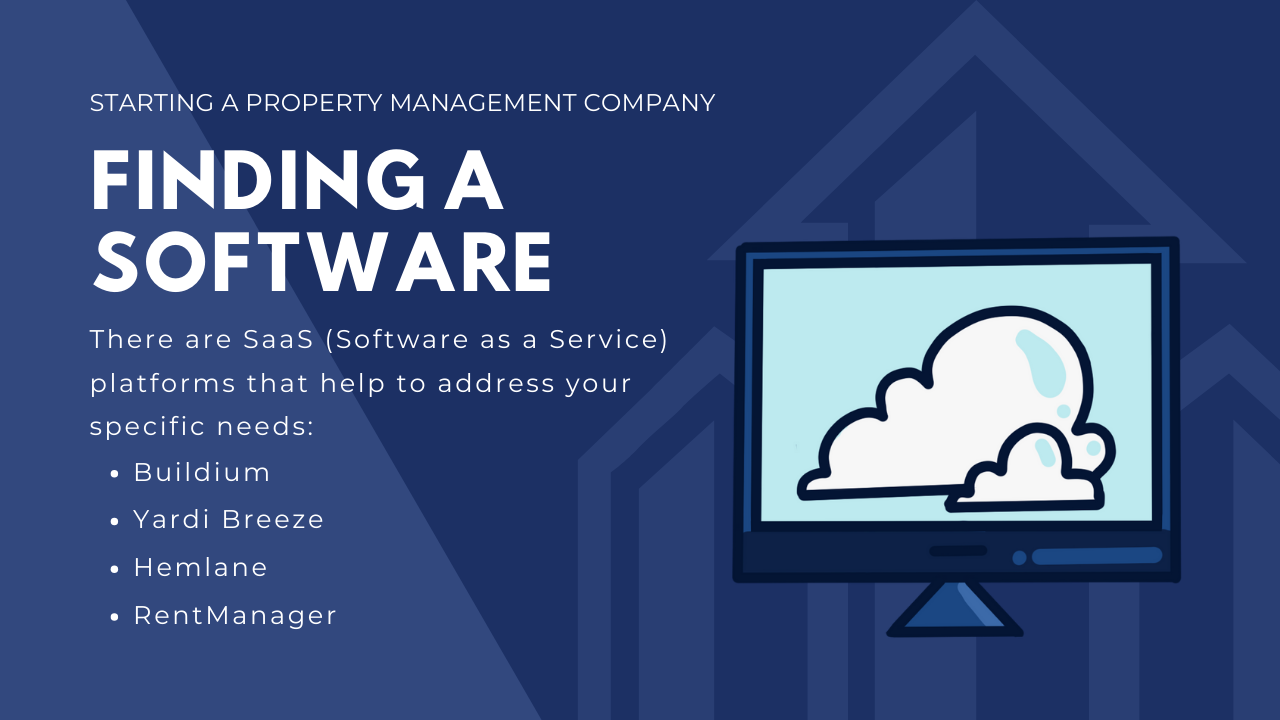
Property management is, at its core, a relationship based business. This means that it is absolutely crucial that you are able to stay on top of every task you need to in order to maintain positive relationships with your team, your clients, and your tenants. After all, your professional reputation is on the line.
Luckily, for any business need you have, there is a software solution to make things easier. Choosing the correct software for your business is important!
For property management companies, there are a number of software options on the market that are designed to help meet your unique company needs.
Some excellent examples that you can check out today include:
- Buildium
- Yardi Breeze
- Hemlane
- RentManager
Ultimately, whatever software you choose needs to be able to meet your company’s needs in order to be truly effective.
We recommend taking the time to do your research and consider what areas of your business could benefit from having a software integrated.
Step 5: Create a Marketing Plan for Your Property Management Company and Attract Leads in North Carolina
Across all industries, there is a common misconception that your marketing efforts are finished once you have already attracted your leads. This is false!
Marketing your property management company is a task that is ongoing and requires its own dedicated time and money.

By starting off your business by investing in a solid marketing plan, you can better ensure that your property management company will experience long term and short term success.
Many property management companies either hire a marketing professional to do this work in house, or they contract the work of freelance marketing professionals or agencies.
Your top priorities when marketing your property management company should be:
- An informative and well crafted company website
- Strong marketing materials, including social media posts, ads, business cards, brochures, information guides, blog posts, and more
- Networking opportunities
FREE Training: How to Launch Your Property Management Company
Step 6: Decide What Your Payment Structure Will Look Like
Before you start to take on new clients in North Carolina, you will need to determine how you will structure your fee collection.
This part of the process is crucial for any business in any industry. After all, at the end of the day, you need to know how you will be making your income.
If you price your services too low, then you may damage your property management company’s credibility in addition to being unable to make any money from your work. You will ultimately struggle to make ends meet.
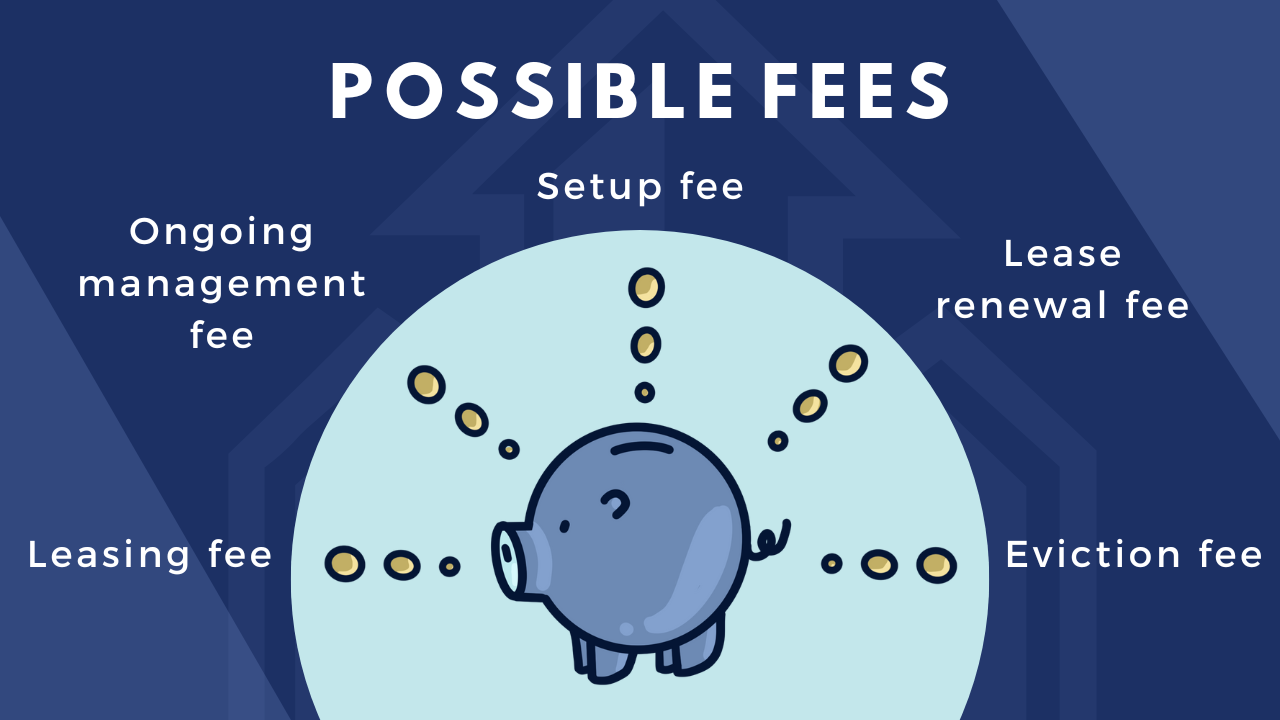
However, if you price your services too high, then you will struggle to find clients who can ultimately find services like yours somewhere else for a better deal.
For this reason, pricing your services is a balancing act that is crucial to get right.
In order to determine the correct prices for your company, you will need to do some market research. Understanding your local market and your competitors is the first step.
Remember, your goal is to simultaneously generate a sustainable income while attracting the interest of new clients.
Ask yourself: what are the going rates for other property management companies in my area with services that are similar to the ones that I offer?
Here are some of the fees to be aware of in property management:
- The setup fee: This is usually around $200-$300, and it is a one time fee that owners will pay in order to set up an account with your property management company
- Ongoing management fee: as the bulk of your monthly revenue, this rate is typically around 3-10% of a rental property’s monthly income.
- Leasing fee: This is a one time fee that property managers can charge in exchange for finding new tenants once a unit becomes vacant
- Lease renewal fee: This is a one time fee that property managers can charge in exchange for renewing a tenant’s existing lease
- Eviction fee: This covers the work that you may have to do should you have to evict a tenant
While these are some great ideas for your property management companies’ fees, it is important to consider your target client demographic when you are in the process of creating your fee structure in North Carolina.
For example, if you are managing multi family homes or apartment complexes, we recommend tailoring your fee structure to take high turnover rates into account.
If you are planning to specialize in single family homes, your structure should take maintenance and convenience fees into account.
If you are focusing on properties who aim to have long term renters, you may want to have a different fee structure than a company who specializes in short term vacation rentals.
FREE Training: How to Launch Your Property Management Company
Step 7: Continue Offering Great Property Management Services in North Carolina and Continuously Re-Evaluate Your Business’ Success
At the end of the day, if you want to have a successful property management company, then it is absolutely crucial that you make sure to always continue to provide your clients and tenants with top notch services.
After all, the best way to keep your clients happy is to provide them with excellent work. This is the true key to long term success in property management.
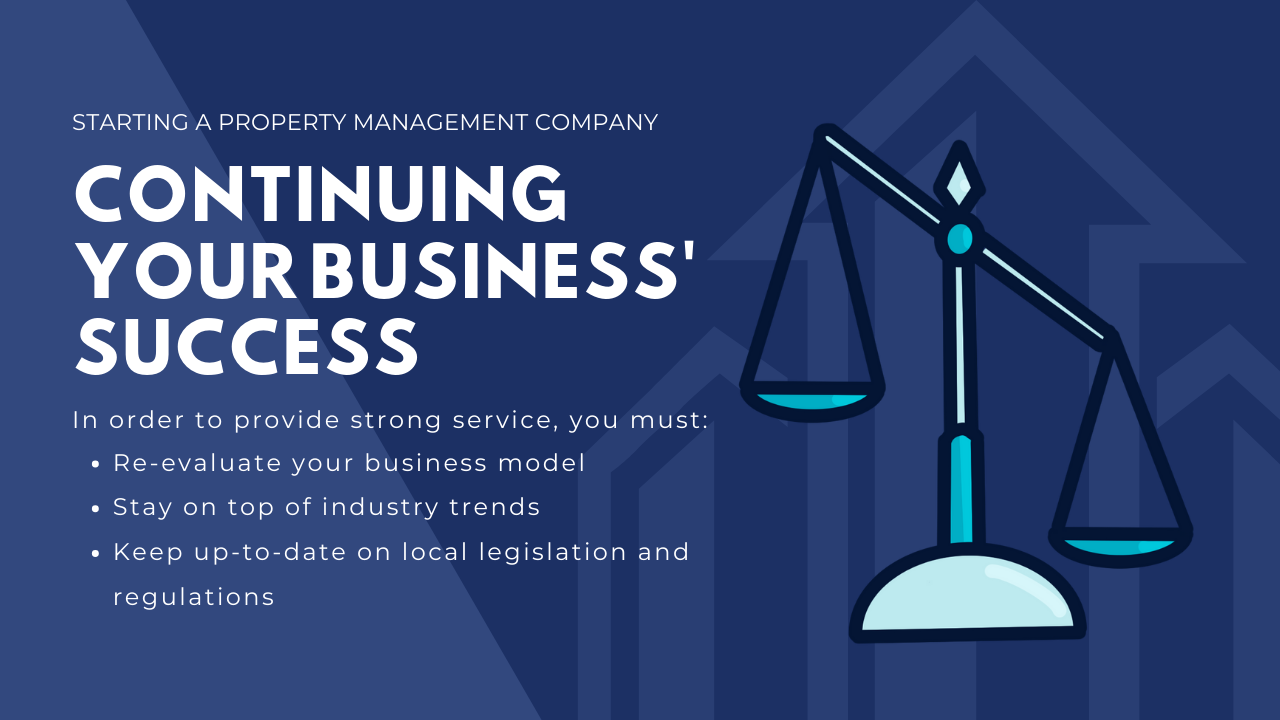
If you want your property management company to grow and evolve over time, you must continue to evaluate your business practices to make sure that they are still the most ideal for your needs.
Further, as you move forward in your property management journey, you will need to make sure that you are always staying up to date on any and all industry trends and local North Carolina state laws.
This will make sure that your business has the ability to stand the test of time and evolve along with the industry, ensuring long term success for your team.
FREE Training: How to Launch Your Property Management Company
The Bottom Line
While we understand that starting your own property management company in North Carolina can be daunting and scary, we are confident that with these tips, you will do just fine.
In fact, there are many resources that are available to you today that can help to make sure that you do not have to face this task on your own!
If you are in need of help for your property management company, or if you have any further questions about starting your own property management company in North Carolina, do not hesitate to contact our team at Upkeep Media.



